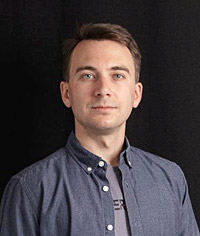
Electronic english version since 2022 |
The newspaper was founded in November 1957
| |
Moscow Region Governor's Award: winners from JINR
JINR scientists Alexander Nezvanov and Vladislav Shalaev have won the competition for annual awards of the Governor of the Moscow Region in the fields of science, technology, engineering, and innovation for young scientists and specialists in 2023.
 Alexander Nezvanov, a researcher at the Laboratory of Neutron Physics at JINR, won the Governor’s Award for a series of scientific papers in the field of research on the interaction of low energy neutrons with nano-dispersed media.
Alexander Nezvanov, a researcher at the Laboratory of Neutron Physics at JINR, won the Governor’s Award for a series of scientific papers in the field of research on the interaction of low energy neutrons with nano-dispersed media.
“About 20 years ago, it turned out that nano-dispersed media effectively reflect radiation with a wavelength of about the size of nanoparticles in the medium,” Alexander noted. “By varying the elemental composition and parameters of nanoparticles, it is possible to create the most effective reflectors of very cold neutrons based on nanopowders, which have almost never been used in practice before. With the advent of new nanostructured reflectors, it was important to understand what processes of radiation-matter interaction are behind the reflection effect. In addition, the reflector’s property optimisation required the development of adequate models of neutron transport in nanopowders. All these formed the main research field of scientific papers submitted for the competition.”
 Vladislav Shalaev, a junior researcher at the Laboratory of High Energy Physics at JINR, submitted to the competition a scientific paper on the development of software tools for studying processes with a pair of leptons in the final state at the LHC and NICA.
Vladislav Shalaev, a junior researcher at the Laboratory of High Energy Physics at JINR, submitted to the competition a scientific paper on the development of software tools for studying processes with a pair of leptons in the final state at the LHC and NICA.
Vladislav is a participant in the CMS Experiment at the LHC at CERN. Vladislav identifies patterns in the spatial distribution of particles (leptons) after the collision of protons with currently record energies, which are available only at the Large Hadron Collider. This information allows researchers to better understand the fundamental structure of the matter surrounding us, as well as the laws of physics that govern nature on a microscale. In addition, a deviation from existing calculations could indicate new, undiscovered particles, and even additional measurements. Vladislav also sometimes deals with these calculations, combining and supplementing existing software packages based on the theoretical model, to extract the necessary theoretical predictions. The group in which the scientist works has recently joined the study of possible dilepton processes in the SPD Experiment.
“The research in which I take part can be fully called fundamental,” Vladislav says. “So, as it always happens to fundamental research, it is as difficult to come up with its practical application now as to guess in what amazing things it will result in a hundred years. But one fact is for sure: working with a large amount of data, storing it, an acceleration process itself, everything that accompanies a modern accelerator experiment constantly requires new computer and technical solutions. And they appear really fast. In other words, fundamental research is the wind in the sails of progress.”
www.jinr.ru